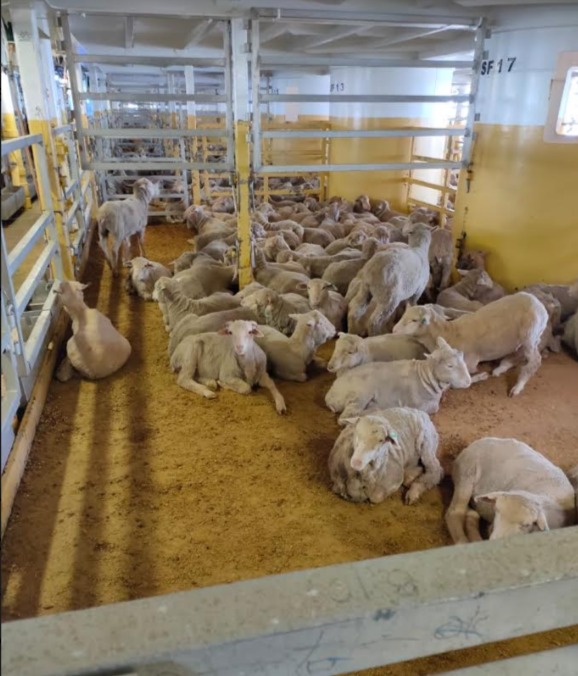
Sheep on the Al Kuwait bound for the Middle East today.
MIDDLE East-bound live sheep vessel the MV Al Kuwait has departed Fremantle with 33,341 sheep after its departure was delayed a further two days by a storm off the Western Australian coast.
The sheep shipment planned for last month has overcome a COVID-19 outbreak among its crew and a denied exemption to the northern summer moratorium to leave WA with a greatly reduced cargo.
The shipment exporter, the Kuwait-owned Rural Export and Trading (WA), was last week granted its second application for an exemption to the June 1-September 14 moratorium and also fought off an Animals Australia attempt to halt its departure. It was initially planned to ship up to 56,000 sheep and 400 cattle to the Middle East on the vessel.
The vessel also has on board the first independent observer of any live export shipment since 17 March 2020, when the Department of Agriculture, Water and the Environment paused their deployment due to the national and international response to the COVID-19 pandemic.
RETWA said the MV Al Kuwait departed at 11 am WA time today and is estimated to arrive in Shuwaikh port in Kuwait on 1 July.
The exporter said loading was completed at 11:30 am on 17 June and the vessel anchored at Cockburn Sound to let a storm front and large swells pass.
The large swells could have caused injury and poor animal welfare outcomes on the lightly stocked vessel, the exporter said.
The vessel departure was initially set for the afternoon of 16 June to avoid the storm and swells; however, approval of loading was delayed by the failed last-minute Federal Court appeal by Animals Australia against the exemption.
RETWA said the vessel has 49 people on board including, an Australian Government-accredited veterinarian (AAV), two Australian stock people and an independent Observer. The importer KLTT worked with local immigration to ensure the AAV, stock people and IO have appropriate visas to be repatriated back to Australia.
RETWA general manager Mike Gordon said the unforeseen and exceptional circumstances that COVID-19 has caused are unprecedented and the exemption is sensible regulation in action.
“We are confident the Al Kuwait’s modern design and ventilation in addition to the risk mitigations in place will deliver a good voyage.”
RETWA said heat stress risk mitigation was the focus of RETWA’s exemption application. Mitigations include the removal of heavier sheep that can be less heat tolerant, ensuring wool length of less than 20mm, not loading specific areas of the vessel, a significantly reduced stocking density and active voyage management with regular expert input on weather routing, animal physiology and livestock management.
A Department of Agriculture, Water and the Environment spokesperson confirmed an independent observer will be deployed to accompany the voyage.
“The exporter’s second application detailed an alternative approach for managing the voyage, including animal welfare.
“The exemption was granted with strict conditions, resulting in substantially fewer sheep in the consignment,” the spokesperson said.
RSPCA still has concerns for sheep
RSPCA Australia last week said it believed the known risks associated with such an export – which is only taking place under an extraordinary exemption from recent federal regulations introduced to protect the welfare of animals subjected to live export – meant5 the shipment should not go ahead.
“Despite repeatedly seeking assurances from the government, we remain gravely concerned about what these sheep will face as a result of this rushed and severely compromised government decision,” senior policy officer Dr Jed Goodfellow said.
“Given the time of year, there is absolutely no doubt that the sheep on this voyage will experience significant suffering as a result of sustained temperatures exceeding their heat stress thresholds.
“No amount of extra space or other conditions can prevent this – that’s exactly why the Northern Summer Prohibition Order and the industry’s own voluntary moratorium on exports was introduced,” he said.
The RSPCA said the dangers of sending Australian animals from winter conditions into the heat and humidity of the Middle Eastern summer are well known and documented at both the state and federal government levels, and these foreseeable conditions may place this shipment in breach of animal protection laws.
The RSPCA urged Minister fort Agriculture David Littleproud to ensure an independent observer travelled on the Al Kuwait to monitor and report on the conditions the animals face.
“This is especially crucial given the history of misreporting in the trade.
“Without a truly independent observer on board, there will be no way of knowing how these sheep are faring as they are forced to endure the inevitable heat stress of a Middle Eastern summer,” Dr Goodfellow said.

HAVE YOUR SAY